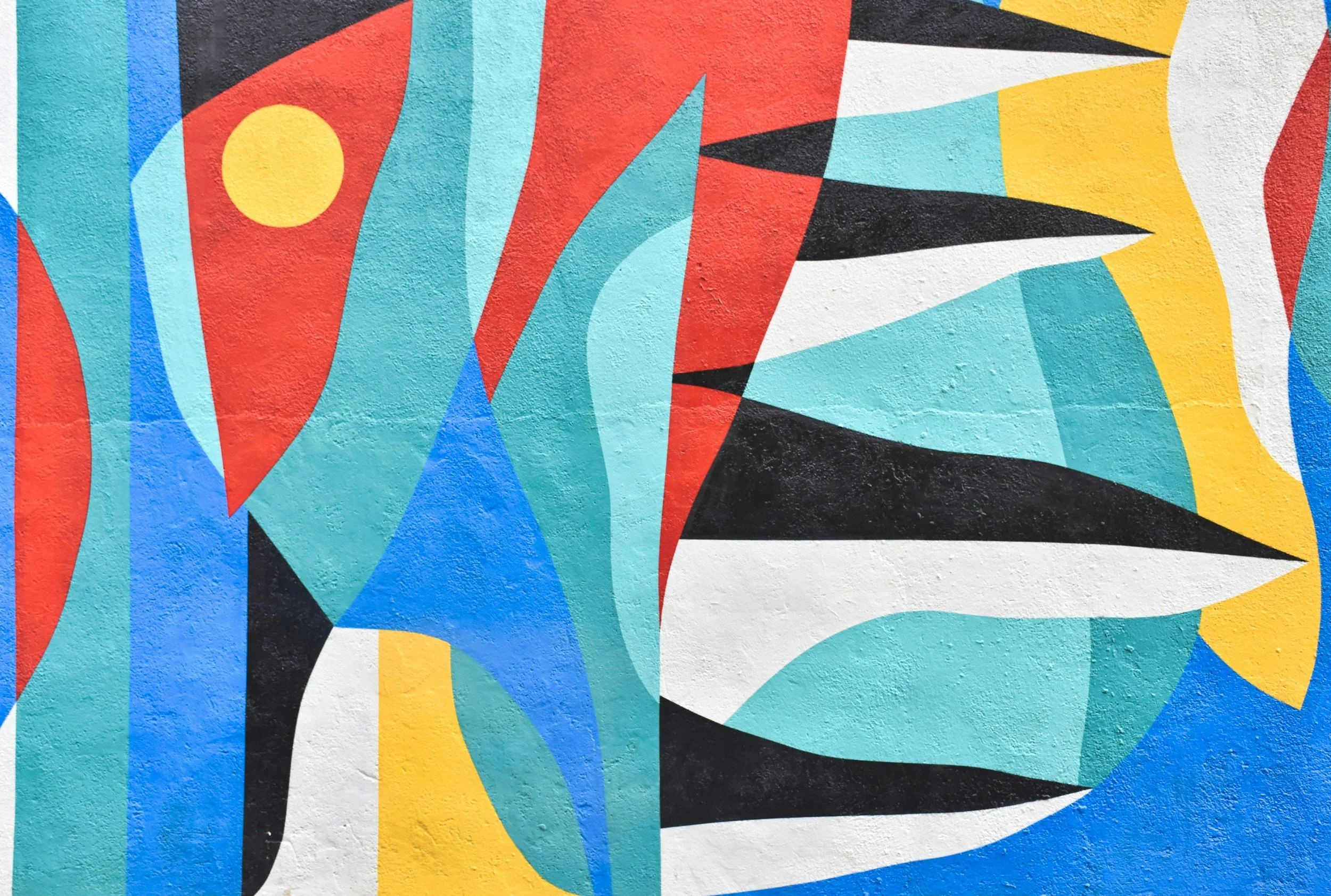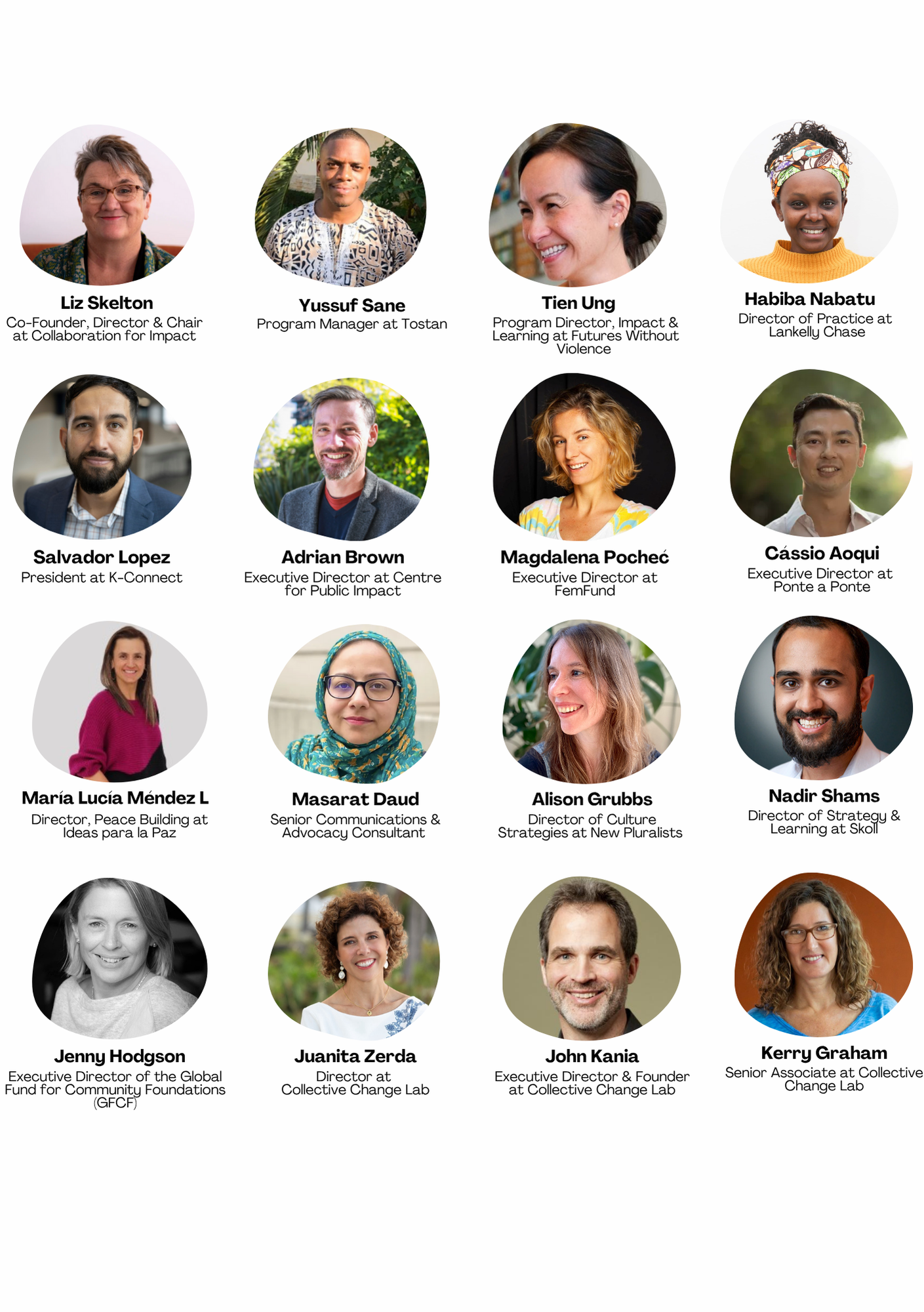
How can Collective Power transform systems?
Imagine a collaboration of individuals, organizations, and communities where each is giving ongoing energy and agency to a shared purpose that is bigger than any one of them. The connection between collaborators is deeply rooted in trust where different knowledges are valued, abuses of power have been surfaced and repaired, and effort is continuously given to interrupting harmful power dynamics when they arise. Power is seen as a shared asset that is carefully grown in ways that are fluid and distributed. More so, power is strategically used - channelled into shared actions and collective accountability that is generating systemic impact and putting the collaboration on a path to enabling transformative change.
Over the past 3 years, Collective Change Lab has been partnering with leaders around the world to learn how power can transform systems towards equity and justice. We have learnt that this type of power within collaboration and systems is possible. And it has a name - Collective Power.
Quick Links:
Reading List for Social Change Practitioners Learning About Power
-
What is Power – Dr. Stein Ringer
The Four Faces of Power – Richard Healey and Sandra Hinson
The Purpose of Power - Alicia Garza
-
The Power Manual - Cyndi Suarez
Understanding Power and Power Dynamics – Dr. Jessica Harbaugh
Power Paradox - Dacher Keltner, PH.D.
Social Science & Power Dynamics – Dacher Keltner, PH.D.
How to think about Power (especially if you have some) – Farhad Ebrahimi
-
Examining Power Dynamics to Advance Systems Change – Collective Impact Forum
Confronting Power Dynamics and Engaging the Community’s Voice in Collective Impact – Collective Impact Forum
Identifying, Managing and Shifting Power Dynamics in CI Initiatives - Collective Impact Forum
Since publishing the relational work of systems change in 2022, Collective Change Lab has been walking with the question How can Collective Power transform systems?
At CCL we think about Collective Power as the power within diverse groups of people and organisations who come together in order to transform systems towards equity and justice. We see Collective Power in all its forms - positional, structural, situational, unearned, spiritual, as well as power through organising and movements. While we have benefited greatly from the significant bodies of work on power (click here for the reading list that inspired us!), we found little scholarly guidance on how to build Collective Power - across experiences, worldviews, boundaries, organisations, sectors - that has the capacity to transform systems. So, we turned to the innovators - the social entrepreneurs, the thought leaders, the collaborations and the funders - who are leading the practice of building Collective Power.
We are immensely grateful to these people and honour them here. Walking together over the last 2 years we have learnt that building Collective Power to transform systems is likely the most vexing part of systems change work. The single reason why it is vexing is that building Collective Power requires us to change - as individuals and collaborations. Building Collective Power asks us to look at who we are, where we come from, what power we have, and how we choose to use it. Further, it requires us to do that ‘live’ - in relationship with people who are very different from us; in circumstances where harm is present and the need for healing and change is critical and urgent. In every way, building Collective Power requires us to be more relational, more human. But when it happens - gloriously, inspiringly - we learnt that transformation is, in fact, possible.
As with all good learning processes, we generated some clear insights and practice directions. We also generated a whole lot more questions. We humbly share all that here. In doing so, we invite you to walk with these learning and questions in your own way. Please use these learnings freely. And please share with us: how are you building Collective Power? What of our learnings and questions reflect your own? What new insights and practices might you share?
Thank you for joining us to walk these questions together. If building Collective Power is as critical to equitable & just systems as we think it is, then we need all our collective wisdom.
Collaborators:
Our response: A framework for building Collective Power that transforms systems
At CCL, we are framework builders. Over the 2 years we’ve been walking with the question: How can Collective Power transform systems?, we have made sense of our learning by iteratively building and testing a framework. We share it with you in the hope it stimulates and expands your work in building Collective Power.
Reviving collective values as the foundations for building Collective Power
CCL’s opening proposition is that building Collective Power first requires us to revive and strengthen collective values.
Most of us exist in this world with Western, colonized values embedded within us. No matter whether we are historically colonizers or colonised, all of us are influenced by the dominance of Western values, and these values significantly determine the way we view and use power. A Western view of power is that:
Power is concentrated. Only a few have ‘real’ power, leaving many feeling disempowered.
Power lies in hierarchical titles and roles. Power can only shift when existing power structures are dismantled.
Power is a zero-sum game. For you to get power, I have to lose some of mine.
Power is a negative concept. A dirty word that obscures the potential of power being a generative force for positive change and mutual empowerment.
It is important to recognise that Western values are about 600 years old. Prior to that, collectivism Collectivism, at its core, emphasizes the interdependence of individuals within a group or community, prioritizing the well-being and goals of the collective over those of a single person. This stands in contrast to individualism, which champions personal autonomy and self-reliance. For transformative change to happen at a systems level values need to from:
Taking this long view allows us to see that Collective Power is not a new thing. As humans, we know how to do this - it is part of our ancestral knowledge and some cultures and groups still practice Collective Power and hold deep knowledge about how to build it and use it. A collective view of power is that:
Power is a dynamic force generated through an interconnected network of individuals, organizations, and communities, within and across systems.
Power multiplies with each authentic relationship, shared value, and act of co-creation.
Power is with and for each other, rather than power over others.
Power centers justice, people, and land; not privilege and capital.
Collaborations who are intentionally building power in this way are becoming ‘nodes’ or ‘fractals’ within systems - we call them Islands of Coherence - that are inherently more equitable and just because their way of viewing and using power is aligned with the impact they are seeking.
The pathway to Collective Power
Moving from a Western view of power to a collective one is an iterative and ongoing process for any collaboration. It is not a project plan or a funding proposal, but a constant cycle towards change. CCL sees the work as a cycle where conditions within individuals and the collaboration are cultivated in an ongoing way. As conditions are cultivated, collaborations are able to engage in transformative practices that build Collective Power through action. And the cycle repeats itself.
Cultivating conditions
We have learnt that conditions need to be cultivated in both:
Individuals - to build healthy and equitable power dynamics, it is crucial that enough members of the Collective understand and reckon with their own relationship with power.
The whole collaboration - power dynamics will only shift if the collaboration
Commits to investing intentional effort in ongoing & iterative progress
Is willing to challenge and change the Collective’s existing beliefs and structures.
Transforming practices
We have also learned that the practices that enable collaborations to build Collective Power are:
Building trusted relationships - practices that foster new trusting, authentic relationships that are pluralistic.
Enacting collectivist values - practices that support a feeling of shared values to guide solutions among diverse stakeholders.
System storytelling - practices that develop inclusive system narratives of past, present, and future, that hold complexity and nuance, and reframes dominant narratives to elevate diverse lived realities.
Collective healing - practices that create and sustain space for healing.
Our key learnings
Our biggest learning over the last 4 years is that Collective Power is essential to support transformed systems. Collective Power is:
An Expansive Force. Collective Power is not finite but an expansive force that grows stronger through deep, sustained connection and generative collaboration. Unlike traditional models of power that view power as a limited commodity to be acquired and controlled, Collective Power operates under an abundance mindset. It recognizes that power is generated through relationships, shared purpose, and collective action.
Relational and Fluid. Power dynamics are fluid and relational, shaped by interactions between individuals, organizations, and communities. Power constantly shifts and evolves in response to the relationships and interactions within a system. Understanding these dynamics requires looking beyond formal positions and titles to consider the informal networks and relationships that influence decision-making and action.
Abundant and empowering. Transformative change requires a shift in consciousness about the way the world works.. It requires moving from a scarcity-based view of power to a view of abundance and interconnection.. This challenges us to move away from deeply ingrained beliefs and assumptions that equate power with dominance and control - and embrace, instead, a worldview that recognizes the interconnectedness of all beings and the potential for collective empowerment.
The question is - how to build it? In the pages that follow we share our most important learnings about the practice of building Collective Power. You’ll find sense-making frameworks, practice guidance, case studies, and links to resources. But, at its core, the three most significant things we have learnt about the practice are:
1. Collective Power requires YOU to change
2.Trust is everything
Collective Power becomes possible when there is enough trust within a collaboration to:
Feel safe and respected in a deep and enduring way
Value and learn from different experiences, knowledges and wisdoms
Collectively and intentionally evolve mindsets through new and, at times, uncomfortable experiences
See conflict as a normal part of the work, engage in it productively and remain in relationship
Openly question ‘who benefits’, actively dismantle oppressive structures, and redistribute power more equitably.
Name and act quickly to interrupt harmful dynamics when they arise. Take responsibility for the harm caused when trust is ruptured AND engage in repair.
3. Collective Healing is the most transformative practice of all
Collective Power becomes possible when collaborations:
Create spaces that nurture healing, resilience, and growth
Acknowledge the systemic and historical trauma inflicted on communities, and understand the need for healing
Adopt practices of embodiment like mindfulness and meditation, creative expression that allow for emotional processing, and collective healing rituals
Enact restorative justice practices that focus on repairing harm, healing relationships, and addressing the root causes of conflict - all of which move power dynamics from punitive to restorative.
Explore and enact ways to make amends for past harms through reparations and holding individuals and institutions accountable.
Click here to learn more about collective healing
Collective Power becomes possible when:
Leaders possess baseline competencies. This includes a strong understanding of their own power, their social location, an analysis of racial privilege, and a commitment to inner work that supports power-sharing. Essential skills like deep listening, thoughtful processing, and authentic communication are also crucial.
Leaders embrace vulnerability. While often undervalued in traditional power structures, vulnerability is essential for Collective Power. It allows leaders to acknowledge past harms, take accountability, and cultivate compassion for themselves and others.
Leaders recognize the transformative potential of sharing power. Relinquishing power requires a shift in mindset - a recognition that empowering others ultimately benefits the whole. Leaders must develop the capacity for gracious sharing, even if it challenges previously held values.
Leaders create space for the disenfranchised. Experiences of marginalization are deeply personal and often traumatic. Leaders must hold space for these experiences with compassion and care, allowing for healing and the possibility of new futures.
Leaders cultivate power literacy. This involves understanding different forms of power, how they operate within systems, and how they can be used to challenge inequities.
Leaders acknowledge both their perceived and actual power. Power is not just about formal authority; it's also about how others perceive us. Factors like positionality, resources, and social capital can all contribute to perceived power, which can have real-world consequences on interactions and access to opportunities. Recognizing this dynamic is key to fostering equity and collaboration.






